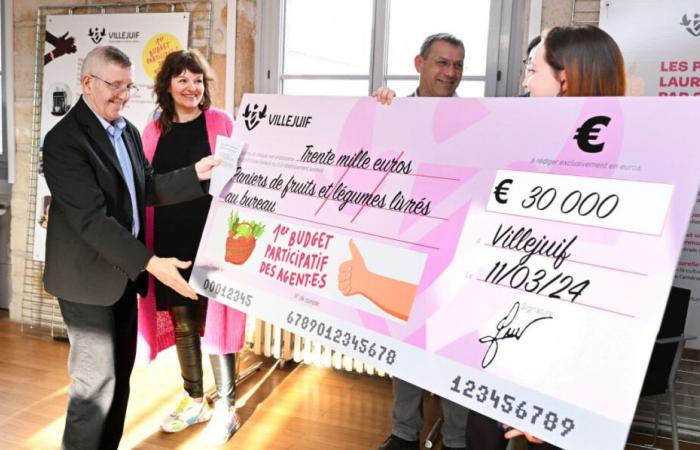
In 2022, at the end of the covid-19 health crisis, Villejuif will not escape the crisis of meaning at work. Agents ask to be more involved in project management. The idea then emerged of organizing a participatory budget dedicated to them. Unprecedented for a community of this size (1,300 agents), the system provides an envelope of 200,000 euros, or 100,000 euros annually for an edition between 2023 and 2024.
In fine168 projects are proposed, 130 are put to a vote and 49 are retained following a vote by a third of the community’s agents. Since the announcement in April 2024 of the winning projects, a quarter have already materialized and more than half will have seen the light of day by September 2024. The remaining projects will be carried out before the end of the year. By the scale of the internal enthusiasm and its impact on the organization, this participatory budget of agents is much more than a display measure, it is a tool in its own right of the city’s managerial policy.
Why launch a participatory budget agents?
As part of a consultation launched in 2022 on the transition to 1,607 hours, the proposal “Allow each team to propose an idea each year for improving their working conditions” is acclaimed by agents as a key measure to improve their working conditions. improvement of working conditions. This demand for autonomy is confirmed by a survey on meaning at work, conducted in the summer of 2023, among all city agents: 55% of participants consider that they do not have the means to express their ideas. It was during a supervisors’ seminar that the logic of an internal participatory budget emerged, with a dual objective: improving the quality of life and working conditions and carrying out actions in favor of of the ecological transition.
In what form?
The envelope of 200,000 euros is split in two: 100,000 euros for collective projects aimed at all 1,300 community agents and 100,000 euros for useful projects in each department. In the summer of 2023, a project team will be formed to carry out the process. It is attached to the innovation unit of the municipality and is made up of four people (two directors and two project managers: the director of culture, the director of human resources [DRH]Alice Inard, employment and skills manager at the HR department and Camille Fraignac, project manager to the deputy general director).
For several months, the project team structures and facilitates the key stages of the participatory budget:
- the drafting of the 10 rules of the game, the eligibility of initiatives and the creation of a feasibility committee representative of agents to guarantee compliance with the rules by project leaders (summer 2023);
- the campaign to submit ideas online and in physical inter-site ballot boxes (September 2023);
- working time dedicated to bringing together similar ideas collected, which also allows the mobilization of generative artificial intelligence (IAG; ChatGPT) to categorize the 168 projects submitted for assessment by the feasibility committee (October 2023);
- the meeting of the feasibility committee of expert agents chosen at random who determine which projects are put to the vote: 130 projects are selected (November 2023);
- the vote: 440 agents decide on their favorite projects online and in ballot boxes. Two collective projects, dedicated to all agents, are winners, as well as 47 projects within departments (early 2024);
- implementation by project leaders (since April 2024).
User-friendly amenities, household appliances, decoration, tables and chairs, cultural or leisure outings, massage seats, green plants, or even small jobs are among the examples of achievements popular within the services. Concerning collective projects, more than 700 baskets of organic fruit and vegetables are delivered free of charge to agents and financial participation is planned for winter holidays as well as various sporting and cultural activities. These initiatives are supported by agents of all categories and services and have an ecological transition dimension.
What lessons can be learned from this approach?
The support of the approach by the general management (Estelle Tarragon, deputy general director and Fabien Fabbri, general director of services) and the elected human resources officials (Anne-Gaëlle Leydier, then Gilbert Chastagnac) can be explained by the strong potential of empowerment of the agents it trains. Indeed, acquiring a coffee machine becomes a project in itself. The agent who wears it thus mobilizes all the project management tools: having the idea, then daring to propose it, seeing it accepted by his colleagues, choosing an ecologically responsible coffee maker model, being supported in choosing the right one public order tool, receive and install the machine in the right place within the allotted time.
Through participatory budgeting, the agents involved feel more capable of testing or proposing larger-scale initiatives.
The participatory budget is therefore a real managerial tool. Because, through it, the agents involved feel more capable of testing, or proposing larger-scale initiatives. It is also an opportunity to rethink the internal chain of public procurement to prioritize production under management as well as the logic of reuse and responsible purchasing, in resourcing, for example, in the realization of projects. The success of this experience of internal democracy is a real source of pride and foreshadows a renewal in 2025 of this exercise to improve the working conditions of Villejuiviens agents.




